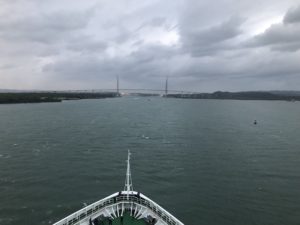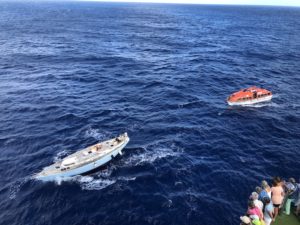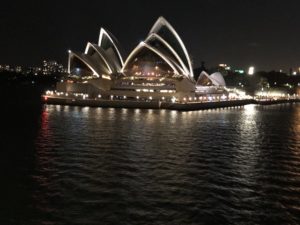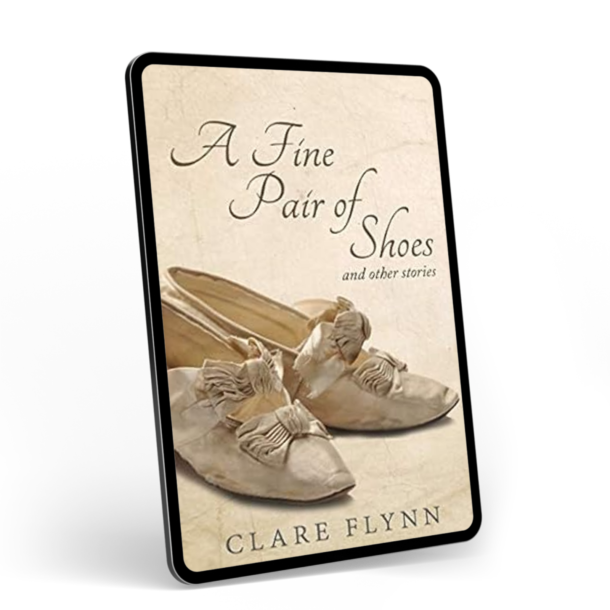While I was ending the third month of my four-month Round the World voyage, one of my old friends, Peter, asked me the following question on Facebook.
“Clare, several of your novels feature long ocean voyages (in very different times) – having circumnavigated two thirds of the globe yourself by sea – any things you’ve learned/would write differently?”
I asked him whether it was an exam question! His response –
“No that would be ‘Personal experience of ocean travel informs the novelist. Discuss.’”
Having had over two months back on dry land to ponder the question I thought I’d better rise to the challenge.
To my great relief there was nothing I learned that made me think “Oh no! I should never have written that.” Although I’d never done a sea voyage, I had read many accounts by others who had. So no, I wouldn’t retract anything I’ve already written.
That said, I learned a HUGE amount that is already informing my two works-in-progress and I hope will provide lots of fodder for the future. Without exception, a voyage by sea appears (even if only fleetingly) in every single one of my nine novels and both working manuscripts. Going on a four-month trip should therefore be viewed as a worthwhile investment!
So here are some observations
On a large ship you keep seeing the same people – and never seeing others
I had been told this by my former agent when I was writing A Greater World. I took her word for it but seven years later I confirmed this for myself. There were more than a thousand passengers on my ship and I’d see the same faces all the time – yet right up to the day I disembarked back in Britain I was still meeting people for the first time. I used this insight in A Greater World:
He was standing alone looking ashore. Since that afternoon, she had not seen him again. She thought it strange, because as huge as the Historic was, it was hard not to keep seeing the same people on board. Perhaps he had been avoiding her?
Doing a long voyage of this type is a strangely dichotomous situation. On the one hand it is like living in a small village you can’t escape from. On the other, waking up each day to see an ever-changing ocean, or a different country, is an incredibly liberating experience.
The sea is an endlessly changing source of inspiration.
As is the sky. Although I didn’t do any work on a book until the last couple of weeks, I did keep a journal to record the places I visited and I often stood at the cabin window and wrote down what I saw. Some of those descriptions will find their way in one form or another into future books. Here’s an example:-
The dawn broke as they reached the end of the Red Sea, the ship hugging the coast where the bright orange of the rising sun burned behind the dark outline of rocks. The flaming brilliance faded to pale pinks and purples, beneath what promised later to be a blue cloudless sky. Then the huge ball of the sun rose up above the horizon, a blazing orb of fire emerging from behind hills. Minutes later, the colour had drained from the sky and the ship had moved past the coastline, into the empty churning waters of the Gulf of Aden, under a burning, now white, sun.
I was also fortunate to witness the total eclipse of the moon on 21st January and the subsequent “blood moon”. It was the day before we transited the Panama Canal. Lying on my back on a sun lounger on a deserted deck I must have had one of the best views on the planet. It was a cold night (I brought blankets up on deck with me), it was late and it hadn’t been announced by the ship, so few people were aware it was happening. My iPhone photos were rubbish but the experience was magical. The blood moon really showed the moon as spherical rather than the flat two-dimensional dish it usually appears.
Sea travel today has many differences from the eras I write about.
 My characters would not have had to endure the tedium of the fortnightly lifeboat drills that Health and Safety requires today. Disasters such as the sinking of the Costa Concordia underline the importance and necessity of these, but it doesn’t make them any less boring – especially when you have to wait while the drill is repeated in German and Dutch.
My characters would not have had to endure the tedium of the fortnightly lifeboat drills that Health and Safety requires today. Disasters such as the sinking of the Costa Concordia underline the importance and necessity of these, but it doesn’t make them any less boring – especially when you have to wait while the drill is repeated in German and Dutch.
I doubt my characters would have had the struggle I had to find a spot on the ship where there was no music playing. Nor would they have been able to escape to their cabin and watch movies. And no fretting for them about lack of internet connectivity.
I recently read the on-board diary of a man travelling with his wife and daughter from England to Hong Kong in the 1930s and then the same by his daughter travelling from Singapore to Mombasa in the 1940s after the Japanese invasion of Malaya. (If you’re interested in how sea travel was then, the book was Castles in the Air, a memoir by Alison Ripley-Cubitt and her late mother). One of the many things that struck me is that the urge for people to play silly games and do things they wouldn’t do on land seems to be universal and timeless. Now, as then, there are shuffleboard games on the promenade deck, quizzes, dances and shows. My instinct was to avoid these like the plague, preferring reading, knitting, painting and sketching and watching movies. Getting drawn into some form of communal activity is inevitable and having said “I never dance these days” I ended up eating my words on more than one occasion. I did watch King Neptune’s Crossing the Line ceremony on the pool deck with the ritual dunkings for first-time crew members (after being covered in flour, eggs and cream) and was awarded my certificate. I drew the line a kissing a dead fish though!
Under and on the sea
 I am afraid I was a bit of a disaster when it came to spotting wildlife. I didn’t see a single dolphin until we got to Gibraltar on the home leg – although I might have seen a dwarf species or a baby near Acapulco – I thought it was a huge flying salmon but was assured it wasn’t. I saw no whales either. No albatrosses. But lots of flying fish.
I am afraid I was a bit of a disaster when it came to spotting wildlife. I didn’t see a single dolphin until we got to Gibraltar on the home leg – although I might have seen a dwarf species or a baby near Acapulco – I thought it was a huge flying salmon but was assured it wasn’t. I saw no whales either. No albatrosses. But lots of flying fish.
On the other hand, I didn’t see ANY floating plastic – I suppose I had expected to run into these enormous country-sized plastic islands but as far as the distant horizon was endless sea.
The Pacific is VERY big. It goes on forever. That gets boring! We had a continuous ten-day stint without sight of land caused when we had to divert to rescue a stricken yacht (see photo). This sounds dramatic but actually was just annoying – especially when the medical emergency that necessitated our 64,000 ton cruise liner to perform the rescue turned out not to be one at all and we missed out on visiting the French Polynesian island, Nuka Hiva.
Sail Aways and Arrivals
 One of the biggest benefits of sea voyages is arriving and leaving port – the Sail-in and the Sail-Away. I will always remember arriving at Sydney in the dark early morning as the city was waking up and leaving by night two days later, watching the lights of the ‘Coat Hanger” and the Opera House fading into the distance behind me. In Japan at Yokahama we were serenaded from the dockside by a talented high school jazz band – an experience that brought tears to my eyes. And arriving at the beautiful Bay of Islands in New Zealand after the long trek across the Pacific and smelling the manuka trees as we took the tender to shore. Even cities I know well offer up different treasures when seen this way – Valetta in Malta with the early morning sunshine bathing the honey-coloured buildings, leaving Lisbon along the Tagus and passing under the road bridge that vibrates above your head like the sound of a swarm of bees, Kagoshima with its erupting volcano just across the bay, and the experience of passing through both the Panama and Suez Canals.
One of the biggest benefits of sea voyages is arriving and leaving port – the Sail-in and the Sail-Away. I will always remember arriving at Sydney in the dark early morning as the city was waking up and leaving by night two days later, watching the lights of the ‘Coat Hanger” and the Opera House fading into the distance behind me. In Japan at Yokahama we were serenaded from the dockside by a talented high school jazz band – an experience that brought tears to my eyes. And arriving at the beautiful Bay of Islands in New Zealand after the long trek across the Pacific and smelling the manuka trees as we took the tender to shore. Even cities I know well offer up different treasures when seen this way – Valetta in Malta with the early morning sunshine bathing the honey-coloured buildings, leaving Lisbon along the Tagus and passing under the road bridge that vibrates above your head like the sound of a swarm of bees, Kagoshima with its erupting volcano just across the bay, and the experience of passing through both the Panama and Suez Canals.
All in all, I found my journey amazing – but not one I would repeat. I’m so glad I did it. I met some wonderful people and saw some incredible countries. Undertaking a continuous voyage of more than thirty-five thousand miles is a truly once-in-a-lifetime experience.


0 Comments